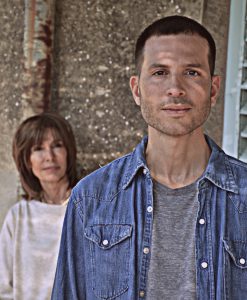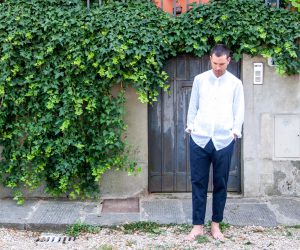 A mother wrote to me: My 24-year-old, heroin-addicted son is in jail. He has been using drugs since he was 14. Today, he asked me to help get him into a sober-house program. I told him that I would help him as long as he has no further involvement with his girlfriend. Even reading what I just wrote I see that I am still trying to control the outcome. I must detach with love and stay close. My next letter to him will be one of hope, love, and courage to move in the right direction and in a timeline that the court decides.
A mother wrote to me: My 24-year-old, heroin-addicted son is in jail. He has been using drugs since he was 14. Today, he asked me to help get him into a sober-house program. I told him that I would help him as long as he has no further involvement with his girlfriend. Even reading what I just wrote I see that I am still trying to control the outcome. I must detach with love and stay close. My next letter to him will be one of hope, love, and courage to move in the right direction and in a timeline that the court decides.
My reflection: I, too, tried to curtail my son’s addiction by issuing ultimatums. It took years of pain for me to realize that I could control nothing. Although I wanted only health and healing for my son, my plan of action for Jeff was often counterproductive.
Today’s Promise to consider: I admit that I cannot control my child’s addiction, and I can’t dictate the rules the disease will follow. What I can control is my own behavior. Today, I will pray, go to support meetings, read addiction literature, and work with professionals. I will stay close with hope and allow my son the space to find the courage inside himself to fight against his addiction.

 Dr. MacAfee wrote: As addicts become increasingly drawn into addiction, their families get drawn into dysfunction. The common dynamic shows the family polarizing and moving into either/or thinking. The addict becomes the major focus for some family members. For others, the addict is a target for rejection, disdain, and fury.
Dr. MacAfee wrote: As addicts become increasingly drawn into addiction, their families get drawn into dysfunction. The common dynamic shows the family polarizing and moving into either/or thinking. The addict becomes the major focus for some family members. For others, the addict is a target for rejection, disdain, and fury. A mom wrote to me: My son is in the thick of alcohol addiction. This last year has been particularly difficult with a third DUI and forced hospitalization. There have been some patches of clarity and health, but the battle rages. A few days ago I finally accepted the fact that my help, over all these years, was not helping and that I could no longer allow him to live with me. Is it possible to stay close if I withdraw my support of a place to live? How do I get out of his way but stay close?
A mom wrote to me: My son is in the thick of alcohol addiction. This last year has been particularly difficult with a third DUI and forced hospitalization. There have been some patches of clarity and health, but the battle rages. A few days ago I finally accepted the fact that my help, over all these years, was not helping and that I could no longer allow him to live with me. Is it possible to stay close if I withdraw my support of a place to live? How do I get out of his way but stay close? From my son, I learned: that his sobriety is rooted in his spiritual practice. Every morning he maintains a routine: he reads from a spiritual or philosophical text, stretches, meditates and prays. Today, his life is based on a set of principles and he must be honest with everyone he meets, including himself. He says that he acknowledges his past and strives for a better tomorrow.
From my son, I learned: that his sobriety is rooted in his spiritual practice. Every morning he maintains a routine: he reads from a spiritual or philosophical text, stretches, meditates and prays. Today, his life is based on a set of principles and he must be honest with everyone he meets, including himself. He says that he acknowledges his past and strives for a better tomorrow. From my son, I learned: Living in sobriety is about giving and receiving. Reaching out a hand to help another person strengthens both the addict and those he tries to help.
From my son, I learned: Living in sobriety is about giving and receiving. Reaching out a hand to help another person strengthens both the addict and those he tries to help. From my son, I learned: that relapse happens. It happened often with Jeff. There are countless examples of recovering addicts like Philip Seymour Hoffman, who stay clean for years, relapse, and die. Drugs are powerful and addiction never rests. It bides its time and waits for the right moment to pounce.
From my son, I learned: that relapse happens. It happened often with Jeff. There are countless examples of recovering addicts like Philip Seymour Hoffman, who stay clean for years, relapse, and die. Drugs are powerful and addiction never rests. It bides its time and waits for the right moment to pounce.
 From my son, I learned that sobriety comes to outweigh all the excitement – big weekends and bursts of pleasure – that drugs provide. He says that being clean lets a person build a life of substance rooted in real relationships with people who truly care about him, and a career he’s proud of. Life unfolds to be profoundly gratifying without drugs. Jeff says this was the biggest realization of all.
From my son, I learned that sobriety comes to outweigh all the excitement – big weekends and bursts of pleasure – that drugs provide. He says that being clean lets a person build a life of substance rooted in real relationships with people who truly care about him, and a career he’s proud of. Life unfolds to be profoundly gratifying without drugs. Jeff says this was the biggest realization of all. From my son, I learned that the knowledge that our family was waiting for him when he got healthy was an important part of his recovery. He knew that when he made the decision to live a sober life, we would be at his side.
From my son, I learned that the knowledge that our family was waiting for him when he got healthy was an important part of his recovery. He knew that when he made the decision to live a sober life, we would be at his side.  From my son, I learned that many addicts hate themselves for the pain they are causing those they love. Recently, a young girl with a crystal meth addiction wrote to me, “My mom tries to help me, but I can’t talk with her. I’m afraid the stress will kill her. I can’t stand myself for hurting her.”
From my son, I learned that many addicts hate themselves for the pain they are causing those they love. Recently, a young girl with a crystal meth addiction wrote to me, “My mom tries to help me, but I can’t talk with her. I’m afraid the stress will kill her. I can’t stand myself for hurting her.”
2 Comments.
View Comments | Leave a Comment